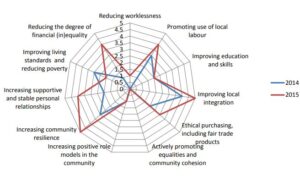
Social Value: Labor Valued by Benefits Conferred
Pam Sornson, JD
January 3, 2023
Another aspect of defining the ‘value of labor’ is to explore the benefits that ‘work effort’ convey to society. In addition to generating revenues for companies and workers, the labor involved in building businesses, industries, etc., brings fundamental taxation revenues and resources for the community as a whole. From that perspective, the value of labor might be measured by the quality of a community’s fundamental infrastructure systems.

Comparable Labor Metrics: All or Just Paid?
Commercial and industrial economic resources, however, flow from paid labor. How does society measure labor that isn’t compensated? How does it evaluate the value of goods and services contributed simply because offering them is deemed a moral imperative?
Innumerable global, regional, and local nonprofit agencies provide invaluable services and products to their communities with no (or few) expectations of financial compensation from beneficiaries. Feeding and sheltering the unhoused, maintaining public land for public use, and furnishing counseling and support for disenfranchised citizens are just a few examples of ‘labor’ performed for the public good and not for compensation or another recompense. Other community members cover the costs they incur as an added element to the service. Appraising the benefits conveyed through the outputs of volunteer effort, then, often requires measuring their impact on both their target populations and the communities in which they live. So how does a society describe the ‘worth’ of these services when their delivery conveys uncompensated benefits in pursuit of higher social values?

Social Contribution as its Own Value
One community in the United Kingdom is exploring this concept through its ‘Social Value’ policies and practices. The city of Salford, 200 miles northwest of London, England, aims to maximize the power of its private and public financial investments by tying them securely to its Social Value principles. In its definition, there are two avenues of social values that can enhance the lives of the entire Sanford community, should all its residents decide to embrace them:
Its core social value encourages building socially and economically viable growth and development opportunities into each contract and agreement, both public and private. For example, construction businesses could sponsor and host apprenticeships through their contractors and subcontractors. These learning opportunities provide invaluable education for local students, learners, and adults and build a labor force infrastructure for the future.
Salford then expanded its roster of social values by encouraging the pursuit of best practices in all aspects of its economy, including environmental management, ethical purchasing, local employment, and other business activities that demonstrate respect for the community.
Launched in 2013, Salford directed its social value policies to engage its citizenry in building and sustaining non-financial, community-wide benefits that would augment positive outcomes, including happiness, well-being, inclusion, empowerment, and environmental care.

Articulating ‘Social Values’
Within that scope, Salford’s Civics planning commissions and public and private enterprises were then encouraged to consider a broader scope of values when investing their resources into individual Salford projects. The town developed a list of social value criteria that companies could use to assess their own social value parameters and then implement into existing or new projects. Civic leaders determined the town itself should be the role model and adopted the criteria as the foundation of its planning and practices strategies. These criteria explore both the challenges that the little city was facing as well as activities and initiatives to address those concerns.

As a ‘Growing’ City:
Salford would prioritize projects that pursued these goals and practices throughout its employment, hiring, and contracting processes: reducing worklessness, increasing workforce resilience by reducing sickness absences and keeping people employed, paying a living wage to its employees, promoting the use of local labor, improving education and skills, strengthening the local economy by buying Salford-based goods and services, developing strategies to attract new businesses and help them thrive, and facilitating good connections between the city and its local commercial community.
As an ‘Innovative’ City:
Salford will develop a better integration network across its existing and emerging systems, ensure that social services are available for all residents while addressing social concerns to reduce the need for social services, and reduce crime and disorder through advanced policy and practices. Salford will also enhance its environmental goals by using sustainable products, ensuring ethical purchasing of Fairtrade goods, improving public spaces, parks, and community areas, and reducing energy use.
As a ‘Cooperative’ City:
Salford will increase opportunities for volunteerism, improve the connections between volunteer sectors, social enterprises, and their mutual stakeholders, include the voices and presence of service consumers as contributors to the policies of their community, actively promote community cohesion and equality, encourage community resilience by facilitating ways for people to help each other, and increase the number of and celebrate Salford’s social values role models.
As a ‘Caring’ City:
Salford pledged to provide resources to improve family life, improve living standards for all while reducing local poverty levels, provide financial direction to reduce or eliminate economic inequality, provide health care direction to reduce inequalities and close the health gap within the town and between the city and the rest of the country, enhance public sector resources to ensure those who need social services can attain them, promote social mobility by informing residents of ways they can access educational, employment, living, and social opportunities, and increase the sense of community by actively pursuing a higher level of trust between leadership and the constituency and minding the mental well-being of its residents.
As a strategy, Salford’s Social Value charter provides direction and suggestions for businesses to engage in practices that give as much benefit to the community as they do to the company. By doing so, the work produced by each company and its labor force create value at all levels of the social strata for individuals, families, companies, neighborhoods, communities, and the town itself.


